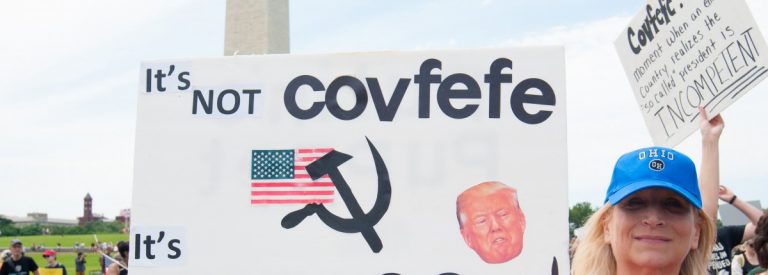
Every year, Northern Michigan’s Lake Superior State University releases its annual List of Words Banished from the Queen’s English for Misuse, Overuse and General Uselessness.
The words and phrases that made it 2017’s list – the 43rd edition – include “Covfefe”, “Fake News”, “Nothingburger”, “Unpack”, “Impactful”, “Tons”, “Let That Sink In” and “Let Me Ask You This”, according to the Associated Press (via South China Morning Post).
“We’ve drilled down and unpacked tons of pre-owned words and phrases deemed impactful by hundreds of nominators during 2017,” said an LSSU spokesperson. “Let that sink in.”
US university list bans ‘fake news’, ‘drill down’, ‘covfefe’ and ‘let me ask you this’ https://t.co/xDlg4IYzTo
— SCMP News (@SCMPNews) December 31, 2017
This word banishing tradition was started by W. T. Rabe, a public relations director at LSSU five decade ago during a New Year’s Eve party. Together with other university faculty and staff, Rabe had come up with the first list of words and phrases that people love to hate.
What started out as a list of language pet peeves among fans started to gain a following, with more and more people sending in their own nominations. Today, it receives tens of thousands of entries, from everyday speech to the news and advertisements, for the list which is usually published in late December.
Last year’s entries include “Break The Internet”, “Vape”, “Presser”, “Manspreading” and “Giving Me Life”. Oxford Dictionaries’ word of the year was “Youthquake” – defined as “a significant cultural, political, or social change arising from the actions or influence of young people” – while Merriam Webster’s was “feminism”.
LSSU’s spokesman John Shibley had expected more political flavour from this year’s list given the polarising 2016 election and the highly charged first year of the Trump administration, but found the list didn’t turn out as he had expected.
“It wasn’t as focused on politics in a very dirty sense.”
“Most of the nominations were well thought through … considering how the year was.”
Shibley refers to “fake news”, used to describe fabricated reporting as well as inaccurate or critical stories, as proof. The entry, which got between 500 to 600 votes, was even used to describe entire news network. A Marist College poll even found it to be American’s second most annoying word or phrase, after “whatever”.
“I think a lot of people know fake news when they see it. It can be propaganda, it can be satire,” Shibley said. “It’s used deliberately to paint a certain story or notion as not being true.”
Have a look at the full list. Tons of impactful covfefe to drill down.
Liked this? Then you’ll love these…
Professor at Jewish uni defends petition against Trump’s Jerusalem move







